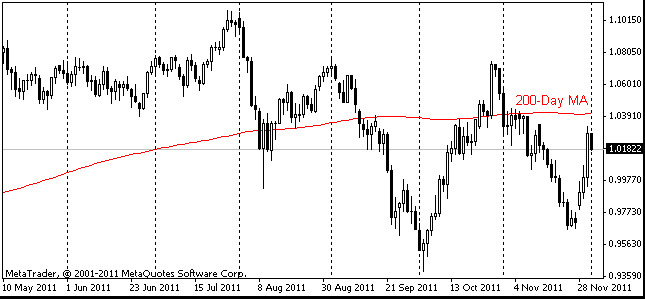EUR/usd
Last weekend was really eventful. Besides, all the published news contributed to the reduction of risk appetite. The euro opened the week with a huge gap down, broke the 1.30 level and stopped just at 1.2950, though Friday's trading was closed at 1.3080. To begin with, the American employment data turned out to be utterly disappointing. The number of jobs in the non-farm sectors grew by 115K. Remember that the earlier market optimism in regard to this indicator was gradually melting away last week. At its beginning the markets forecasted the 200K growth, while by its end the jobs were expected to increase just by 160K. But the factual data proved to be even lower than this. The current growth rate is the lowest since October 2011. The manufacturing industry added just 16K, which is the minimal level since November. The bitter pill was sugared only by the backdated increase of the figures for the previous two months. All this didn't smooth the slowdown much. Again and again the winter impetus dies away by summer and economy falls into stagnation. Investors shouldn't be too happy about the reduction of unemployment down to its 3-year low of 8.1%, as it was a result of the sharp 342K decline in the participation rate in April. The average hourly earnings rate showed even a stronger slowdown and totaled just 1.8%. For all that, it would be interesting to know how the fomc, the members of which almost unanimously claimed last week that there was no need in further stimulation of economy, feels under such circumstances. Further about Europe. The elections in France have ended with the victory of Hollande, which accordingly implies the end of the “Mercozy” era. What's really unpleasant is that Merkel and Hollande had already addressed each other with stinging remarks before it became known that Germany would have to save Europe alone, without the support of the eccentric French president. The Greek affairs are far from being perfect as well. The two ruling parties, New Democrats and the socialist movement PASOK, managed to retain only half of the seats in the Parliament. Remember that only these parties openly support the bail-out terms of UE/IMF/ECB. Others have been indulged in populism and, one or another way, spoke about the possible secession from the EU. There remains only to see what they will do when in power. One thing is sure: it's period of change in Europe.

GBP/USD
It looks as though the wind had changed its direction for the sterling as well. Following the 10 ½ -day rally, the correction phase has set in. It's too early to speak about the all-out sales now, but the fact, that for 6 trading sessions in a row the pound has been falling vs. the dollar, cannot be overlooked either. A week ago the pound reached the 1.63 level and by now has already gone down to 1.6120. This trend may persist further as the poor news will be affecting the American and European exchanges. Britain is having a rest today.

USD/JPY
The Friday's sale of risky assets on the poor US employment data spurred the demand for the yen. The market pendulum again swayed towards buying of liquid assets, thus contributing to the decline in the yielding ones. So, on the payrolls USD/JPY again dived below 80. But by now it's been trading for about 12 hours in the narrow corridor around 79.80. The splash of life n this pair hasn't been long.

AUD/USD
We again see that among the aussie-traders there are few who buy the currency, being guided by the fundamental domestic figures. Thus, the reaction to the unexpected 50bp cut of the interest rate at the beginning of the last week produced a weaker effect on AUD/USD than the weakness of the US employment market and political uncertainty in the Euro-Zone. The Aussie trading has looked more like the stock index trading over the recent days. But what is really important is that the Australian dollar on the fly broke the multiple support level of 1.0250 and is now trading at 1.0130. Is the parity on the doorstep? So much for the wind of change!
